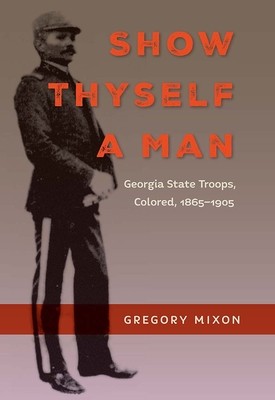
- We will send in 10–14 business days.
- Author: Gregory Mixon
- Publisher: University Press of Florida
- ISBN-10: 0813080622
- ISBN-13: 9780813080628
- Format: 15.6 x 23.5 x 2.5 cm, softcover
- Language: English
- SAVE -10% with code: EXTRA
Reviews
Description
Georgia Historical Records Advisory Council award for Excellence in Research in Using the Holdings of ArchivesThe history of Black militias in Georgia after the Civil War and their importance in defining citizenship
In Show Thyself a Man, Gregory Mixon explores the ways in which African Americans in postbellum Georgia used militia service after the Civil War to define freedom and citizenship. Independent militias empowered them to get involved in politics, secure their own financial independence, and mobilize for self-defense.
As whites and blacks competed for state sponsorship of their militia companies, African Americans sought to establish their roles as citizens of their country and their state. They proved their efficiency as militiamen and publicly commemorated black freedom and progress with celebrations such as Emancipation Day and the anniversaries of the Civil War Amendments. White Georgians, however, used the militia as a different symbol of freedom--to ensure not only the postwar white right to rule but to assert states' rights. This social, political, and military history examines how Black militias were integral to the process of liberation, Reconstruction, and nation-building that defined the latter half of the nineteenth century South.A volume in the series Southern Dissent, edited by Stanley Harrold and Randall M. Miller
EXTRA 10 % discount with code: EXTRA
The promotion ends in 20d.16:46:14
The discount code is valid when purchasing from 10 €. Discounts do not stack.
- Author: Gregory Mixon
- Publisher: University Press of Florida
- ISBN-10: 0813080622
- ISBN-13: 9780813080628
- Format: 15.6 x 23.5 x 2.5 cm, softcover
- Language: English English
The history of Black militias in Georgia after the Civil War and their importance in defining citizenship
In Show Thyself a Man, Gregory Mixon explores the ways in which African Americans in postbellum Georgia used militia service after the Civil War to define freedom and citizenship. Independent militias empowered them to get involved in politics, secure their own financial independence, and mobilize for self-defense.
As whites and blacks competed for state sponsorship of their militia companies, African Americans sought to establish their roles as citizens of their country and their state. They proved their efficiency as militiamen and publicly commemorated black freedom and progress with celebrations such as Emancipation Day and the anniversaries of the Civil War Amendments. White Georgians, however, used the militia as a different symbol of freedom--to ensure not only the postwar white right to rule but to assert states' rights. This social, political, and military history examines how Black militias were integral to the process of liberation, Reconstruction, and nation-building that defined the latter half of the nineteenth century South.A volume in the series Southern Dissent, edited by Stanley Harrold and Randall M. Miller


Reviews